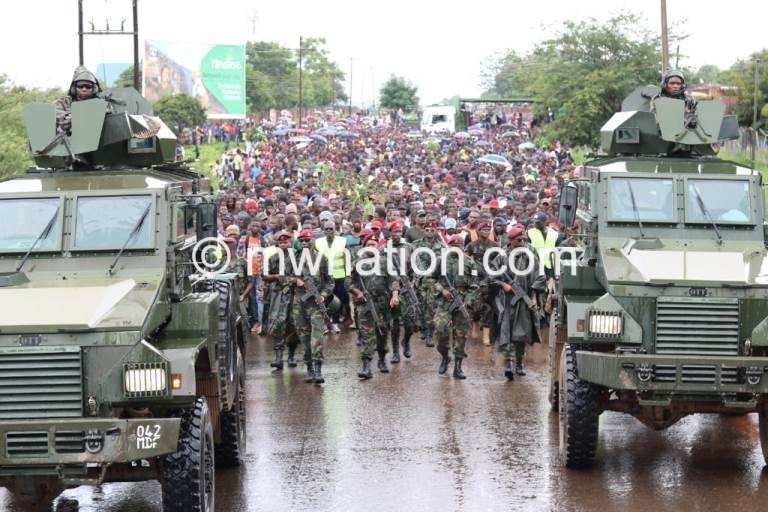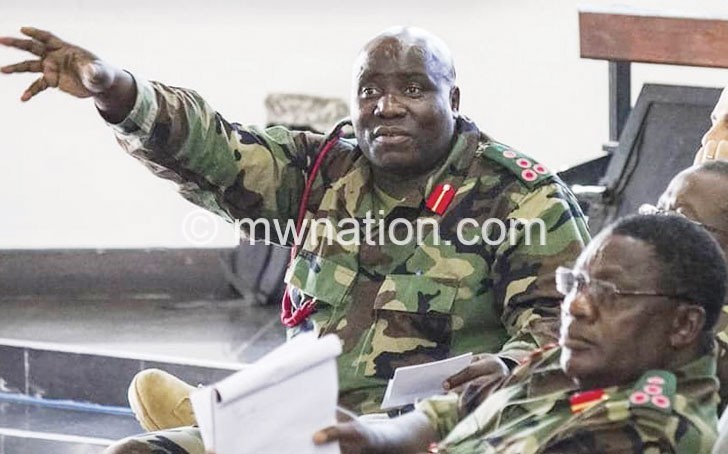Soldiers’ epic march on impunity
It takes a strong institution to protect citizens marching against their rulers. The assignment can be tougher for security agencies arm-twisted by a tricky chain of command. Our Features Editor JAMES CHAVULA traces Malawi Defence Force (MDF) long march with civilians angry at electoral injustice.
No smile. No rants. No intimidating armed security that followed him for six years. No smile. Just a grieving president reluctant to concede defeat in Africa’s first repeat poll won by an opposition leader.

Last Saturday, Peter Mutharika was visibly a dead man walking when he addressed journalists about the historic fresh poll he discredited as the country’s “worst-ever election”.
The setting was Sanjika Palace in Blantyre some six hours before the Malawi Electoral Commission (MEC) chairperson Chifundo Kachale declared Lazarus Chakwera, 65, the winner in what Catholic bishops billed credible, free and fair election.
At Nyambabwe Hill, soldiers were seen escorting the triumphant Malawi Congress Party (MCP) leader on a 345-kilometre dash to Lilongwe where he took office on Sunday morning.
MDF had done it again!
Constitutional lawyer Edge Kanyongolo, from the University of Malawi’s Chancellor College, states: “Frankly, it has become an expectation of mine that this is the way things are supposed to happen.
“Although it was sad to see Mutharika in that shape, I was filled with pride in knowing that I am a citizen of a country whose armed forces doesn’t owe personal allegiance, but go where the lawful authority is. The military has come to our rescue many times.”

The soldiers guarding the people’s choice firmly put the expectant nation on a cusp of a peaceful transition from a regime ruined by corruption, impunity and nepotism.
This is a lengthy love story of citizens at the mercy of their rulers and a military force always there to safeguard the rule of law.
Throughout the election Kachale’s team ran within 20 days, the soldiers jealously guarded the integrity of the vote from the polling station to the tally centre in Blantyre
The outcome sharply contrasts with Mutharika’s narrow win in the May 2019 presidential election the Constitutional Court annulled due to “widespread, systematic and grave” irregularities.
Ready to kill
The edition to forget triggered serial protests where the soldiers often subdued governing party cadres calling themselves “youth cadets”, who ruthlessly attacked marchers angry at electoral injustices.
Masauko Thawe, who convened protestors in the Southern Region, salutes the soldiers for taking sides with civilians in the longest string of mass protests since the dawn of democracy in 1993.
“It wasn’t an easy struggle,” says the Human Rights Defenders Coalition (HRDC) regional coordinator. “When I saw the DPP thugs coming to attack us and stop the struggle, I was terrified. They aimed to kill us and we were receiving death threats. However, MDF’s intervention gave us relief and courage to soldier on.”
The soldiers intervened on July 26, the day for the “one million march” to State House, which HRDC chairperson Gift Trapence considers a turning point in the movement against an arrogant regime and MEC headship.
In Lilongwe, the soldiers peacefully prevented thousands of determined marchers from getting to Kamuzu Palace.
In Blantyre, however, Thawe’s team had a rude awakening when party operatives stood sentry before daybreak and assaulted would-be marchers and anyone wearing red.
Ironically, gun-totting police officers, with teargas canisters hanging in their waistbelts, stared helplessly as party operatives harmed civilians perceived as enemies of the regime.
The heavies brazenly bragged that they were ready to kill in defence of Mutharika’s controversial win, warning they would not allow traitors in their stronghold.
“We won’t tolerate sellouts in our father’s bedroom. Take your nonsense to the North or Centre,” said a brawny bloke, revering Mutharika as Adadi, his political godfather.
The soldiers swiftly crushed the reign of terror, detaining and disarming the heavies who were seen bleeding as they were being bundled into military trucks.
They did not stop protecting protestors demanding the sacking of MEC chairperson Justice Jane Ansah, who dismissed the uprising as mob justice.
In the court of public opinion, the Malawi Supreme Court of Appeal judge became the face of an electoral commission pronounced incompetent by both Parliament and her seven colleagues in the highest court.
Her critics fished out photographs where she smilingly posed with delighted DPP cadets just a day after announcing Mutharika’s highly disputed victory.
The defence forces protected the demonstrators until the court nullified Mutharika’s re-election as petitioned by his runners-up Lazarus Chakwera and Saulos Chilima desired.
During the case in which the two took to the witness box, MDF deployed armoured vehicles to shuttle the five judges to Lilongwe Courthouse. On the ‘judgement day’, a military helicopter hovered over the court premises for hours as heavily armed forces wearing battle dress guarded the judges, clad in bulletproof vests, hopping out of the armoured vehicles one by one.
“MDF contributed a lot to the fight against electoral injustice. We are celebrating change today because of their strong institution and independent courts which stood with the people tired of impunity,” Thawe states.
He urges “captured institutions”, especially police and city councils, to embrace the professionalism illustrated by soldiers and courts during the marches Chakwera and Vice-President Chilima twice attended.
“We’re only defending our rights. Had MDF decided to fight us, many civilians would have been martyred and an arrogant regime would have continued to govern without a mandate from the majority of voters,” the human rights defender recalls.
Always pro-citizen
Chakwera, who has pledged “ a better Malawi for all Malawians”, praised the soldiers for consistently upholding constitutional order.
“From the inception of our democracy in 1993, the defence force has always acted in the interest of protecting civilians from the aggression of their government,” said Chakwera.
Last August, Chilima cautioned DPP to spare the armed forces from “a culture of nepotism” most likely to water down its widely acclaimed discipline and professionalism.
According to retired brigadier Marcel Chirwa, MDF operated within its constitutional mandate to guard the rule of law and the safety of Malawians.
Section 160 of the Constitution states that no one may direct MDF to act contrary to the Supreme Law.
“The roles of the police and the defence force are different. The police protect property and soldiers take care of the nation or the people you call the civilians. They will not tolerate anyone to disturb the peace,” he explains.
The military personnel was handy during the push to restore democracy in 1992 when they disarmed Malawi Young Pioneer (MYP).
The fall of the MCP paramilitary wing cleared the way for a peaceful referendum in which Malawians elected the lamp of democracy over founding president Hastings Kamuzu Banda’s dictatorship.
When president Bingu wa Mutharika dropped dead in April 2012, MDF general Henry Odillo heroically protected vice-president Joyce Banda to take over as required by the Constitution.
A year later, a state-sponsored inquiry quoted Bright Msaka, who was Chief Secretary to the Office of President and Cabinet during Bingu’s reign, as saying Mutharika suggested that soldiers take over.
Oddly, six ministers gathered around midnight and told journalists that Banda would not succeed Bingu, who sacked her from their party two years earlier.
In 2013, Banda and the US Army awarded Odillo medals of honour for bravely upholding constitutionalism in the tricky transition of power.
People’s general
Currently, Malawians thrilled by the mass resistance to electoral injustice say Vincent Nundwe, the general who protected protesters, deserves similar honours.
Malawians were already up in arms when Nundwe succeeded Griffin Supuni on June 22.
“My priority is, first of all, to ensure that Malawi is sovereign. I will also ensure that Malawi is peaceful. MDF will protect everyone without considering their tribe or anything,” he told The Nation just hours after his promotion.
Eight months later, the ‘people’s commander’ became the fourth MDF general sacked by Mutharika in just six years. He was fired the same day Mutharika refused to kick out MEC commissioners found incompetent by Parliament.
However, he stood down “a happy man”.
“My conscience is clear that I performed to the requirement of the office. I have no regrets for I have done my part,” he said.
Mutharika seemed on course to create a generals’ brigade likely to become a hazard to national security if not a wealthy source of military insights.
Youth and Society (YAS) director Charles Kajoloweka, who marched alongside the soldiers in Mzuzu, fondly remembers Nundwe as a streetwise general.
He declares: “Overall, the defence forces have been very progressive under the former commander, a people’s defender who ensured that armed forces remained professional and independent of any political interference. “Even after what could be a political dismissal, he exited in a manner that didn’t create tension. Interestingly, how his successor [Peter Namathanga] has executed his work is encouraging. We can confidently say we have an armed force that’s ready to protect Malawians and the Constitution all the time, an establishment that has a legacy to defend. MDF remains one of the most disciplined institutions that have always helped uphold the rule of law in the country.”





